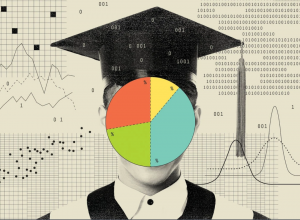By Molly Worthen
Contributing Opinion Writer
I teach at a big state university, and I often receive emails from software companies offering to help me do a basic part of my job: figuring out what my students have learned.
If you thought this task required only low-tech materials like a pile of final exams and a red pen, you’re stuck in the 20th century. In 2018, more and more university administrators want campuswide, quantifiable data that reveal what skills students are learning. Their desire has fed a bureaucratic behemoth known as learning outcomes assessment. This elaborate, expensive, supposedly data-driven analysis seeks to translate the subtleties of the classroom into PowerPoint slides packed with statistics — in the hope of deflecting the charge that students pay too much for degrees that mean too little.
It’s true that old-fashioned course grades, skewed by grade inflation and inconsistency among schools and disciplines, can’t tell us everything about what students have learned. But the ballooning assessment industry — including the tech companies and consulting firms that profit from assessment — is a symptom of higher education’s crisis, not a solution to it. It preys especially on less prestigious schools and contributes to the system’s deepening divide into a narrow tier of elite institutions primarily serving the rich and a vast landscape of glorified trade schools for everyone else.
Without thoughtful reconsideration, learning assessment will continue to devour a lot of money for meager results. The movement’s focus on quantifying classroom experience makes it easy to shift blame for student failure wholly onto universities, ignoring deeper socio-economic reasons that cause many students to struggle with college-level work. Worse, when the effort to reduce learning to a list of job-ready skills goes too far, it misses the point of a university education.
Image credit: Joan Wong/NYT

